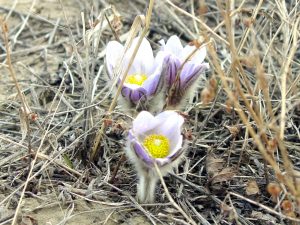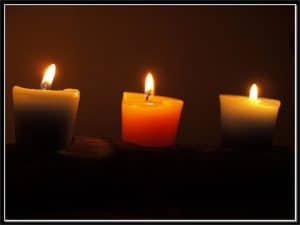 by Sara Katherine Staheli Hanks
by Sara Katherine Staheli Hanks
This post is offered in conjunction with a new online course for post-Mormon womxn*. You can learn more here.
I’ve started dozens of journals in my life, but I don’t tend to stick with them. The oblong blue notebook with an orange fish on the cover is my one and only journal with the pages all filled up. I got it because my therapist said it would be important to record tiny breakthroughs at a critical juncture of my life. It was 2014. There were a few main reasons I sought out therapy, but when I sat down and got to work, when I actually put pen to paper, all my stress and feeling was saved for questions of religious identity. I was tearful and angry and confused about my status as a Mormon woman.
***
June 9, 2014
I’m reading the book “The Dance of Anger” by Harriet Lerner. These lines stood out tonight:
“There are few things more anxiety-arousing than shifting to a higher level of self-assertion and separateness in an important relationship and maintaining this position despite the countermoves of the other person.”
Instead of relating this to a marriage relationship, I relate this to my relationship with the church. It’s not a perfect parallel, because the church doesn’t really make countermoves in direct response to me. But the notion of “shifting to a higher level of self-assertion and separateness … and maintaining this position” definitely fits.
I wonder what level of “separateness” from the church I’m comfortable with and would be best for me, now and in the future.
It seems very clear at this point that I can’t rely exclusively (or even at all, sometimes) on the church for spiritual growth or sustenance. And I’m mostly fine with that. There are days when I mourn it all over again, but overall, I think I’ve made peace with that aspect. Is that level of separateness enough?
***
Pardon the late-90s pop culture reference, but you know the movie Titanic? As part of the narration, elderly Rose talks about her state of mind when she was about to board the famed ocean liner:
“Outwardly, I was everything a well-brought-up girl should be. Inside, I was screaming.”
I think of that line all the time when reflecting on this phase of my life. My outward Mormon appearance was good, hitting all the marks, checking all the boxes. But it had nothing to do with what was really going on under the surface. I was mad, and I was scared, and I felt completely powerless to resist all the stories that were holding me hostage.
***
June 19, 2014
I have the feeling that I need a fundamental paradigm shift with the church. Some totally different way of relating to it. But it’s hard to say what that would look like, what exactly I need to change.
To some extent, the church has been an authority figure in my life, and it still is, but right now, I don’t want it to be. I don’t want to look to the church for permission or approval or even guidance. I don’t want to allow it to allow me. I don’t want the church’s standards to be part of my decision-making process at all.
***
Nowadays, when I look back on what I wrote in the blue journal with the fish on the cover, I feel a lot of things. I feel grateful for a therapist who encouraged me to document what was going on inside me, because it really is a tremendous gift to have this portal, this time machine, to transport me momentarily into a version of myself that’s faded with time. I also feel sadness for the heartache of the woman in these pages; I want to scoop her up and hug her, hug my former self into knowing that she’s not powerless, not fated for a life of contorting herself into whatever shape will get the most approval.
Mostly, though, I just feel proud. I did some hard work in those days, asked myself questions that I didn’t particularly like and then really looked for answers. I opened myself up to the possibility that I might find God in new places, new forms.
***
July 8, 2014
After some consideration, I’ve decided to take an extended break from church. So many little things add up, but finally, it’s a matter of paying attention to what my heart and my body are saying.
I hope I can come back with more peace and inner strength. I’m open to learning that I’m better off out in a more permanent way, but I hope that’s not the case. The fact that this is the religion of my birth and my ancestry is important to me. If I can stay in a way that’s healthy for me and my family, I’d like to do that.
***
It’s been almost five years since I wrote all these entries. Long story short: I took that break, but it only lasted a few months. I went back and stayed active and engaged for a while, but it got harder and harder, and I stopped attending for good in the spring of 2017. All throughout the process, and still to this day, spirituality has been a natural part of my life and something I’ve cared a lot about.
It seems to me that many post-Mormon or ex-Mormon folks are no longer interested in pursuing another spiritual path or exploring their religious beliefs once they step away from the church, and that’s an entirely valid choice for all kinds of reasons. That said, it never felt right for me. The things I had loved about being Mormon, the moments that kept me active for so long even when it was difficult, always came down to spiritual nourishment. The hunger didn’t go away.
***
July 16, 2014
I’m reading a book about the Dalai Lama, and it talks about how if you’re so narrowly focused on one acceptable solution, it’s like you’re looking for a lost item but you’re so sure that it’s in one certain room that you refuse to look outside that room — you close yourself off to finding it in an unexpected place. As I contemplated “listening” last night, I thought of how I’ve listened and paid attention to my church-related fears and frustrations and grief, but I’ve only been willing to look for solutions/growth in places that wouldn’t threaten my status as an active Mormon woman. I haven’t really listened to anything that might endanger that. And now I am.
***
When I was active, I tried to remain receptive to other truths, other teachings, from various faiths, but when I separated myself firmly from the church, stopped attending and stopped feeling like that was a problem, the shift was profound. I didn’t see those other rooms, those other spiritual resources, as cute accessories anymore — “Oh, this will be nice to add to my collection!” It was suddenly possible to look in unfamiliar places and find the exact thing I was looking for, the exact myths and practices and guides I needed, and to let them capture my imagination completely.
For those who feel an impulse towards spiritual seeking, there’s almost no end to the possible sources of growth. The important thing, I think, is to believe in your authority to find those seeds of spirituality, whatever they are, and know you’re empowered to decide what belongs in the garden of your faith and do the work necessary to help it grow.
Separate from traditional Mormon observance, there is still blessing. There is wild faith, sprouting up like weeds in the gravel.
Recently, moved by the simmering spiritual need we’ve observed in so many post-Mormon womxn*, my friend Zina and I began developing an online course. We were drawn to metaphors of plant life and gardening in relation to spirituality because they reflect individuality and the cyclical nature of personal growth. No two gardens are the same; some are full of flowers, others more interested in vegetables and fruits that can be eaten. Gardens can be small or large, brand new or maintained for generations, well-organized or wild. Gardens change with the seasons and evolve over decades. The plants that grow within them have their unique cycles of rest, sprout, blossom, shed, and rest again. All gardens (be it a few flowers on a window sill or a full acre of bounty) require fertilizer, and the best fertilizer is compost that forms as we let go of what no longer serves us and allow for death, decay, and growth in our lives. We believe the wisdom from the earth manifest in these plant teachers and cycles is fertile ground for processing and adapting a spiritual life.
We call this course “Roots, Seeds, and Weeds: Cultivating a Spiritual Garden Beyond Religion.”
The course provides powerful content to help you clear the ground, prepare the soil, envision the possibilities, and gather the seeds and roots you need to craft a thriving spiritual garden of your own creation. It will also create a safe and intentional online space you can use to evaluate and evolve in this sometimes overwhelming process. As teachers, we are here to help support you as you ask yourself what is growing in your garden, what’s thriving, what’s wilting? What would you like to plant in the future? Our intention in every moment will be reinforcing the ultimate fact of your authority — that you have all the power necessary to plant a garden and create a spiritual practice that is life-giving for you.
“Roots, Seeds, and Weeds” is a 6-week online course that runs from April 29th to June 9th. Registration is open now through April 28th. We’d love to have you join us. All the information can be found at this link.
*Womxn is an alternative spelling of “woman” or “women” that suggests intersectionality, inclusivity, and autonomy of the feminine. Alternative spellings from the 1970s such as “womyn” and “wimmin” began the tradition of claiming language that asserts an independent feminine reality, not one that is simply a derivative of the masculine reality. “Womxn” was created to be more inclusive of those who identify as femme, transgender, and so forth and to indicate a greater emphasis on intersectionality. Our use of “womxn” in this course information is meant to suggest a welcoming of transgender and cisgender women and femmes. Non-binary folx who are interested in this course are fully empowered to make the call on whether it is a good fit and are welcome to contact Zina and Sara if they have any questions.






3 Responses
Thanks for sharing our journey with us, Sara!
I have grown so much since I let go of my outward expression of the role ‘Mormon woman’ in everything I did. it has made it a lot easier to find out who I actually am and to make my spiritual journey my own
I love your use of metaphors describing your spiritual growth. I’m excited to learn more about this class!